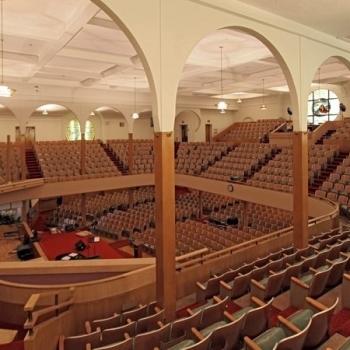On the last day of our GBCS young clergy leadership forum, we learned the term “glocalization.” It’s actually not an affirmation of the activist world cliche that we should “think globally and act locally.” The problem is precisely that we too often think about activism in global terms instead of local ones. Activism that is understood in kingdom terms should always seek as localized a form as possible even if it occurs over a distance that is global. Let me explain.
To think globally is to view problems in the world from an abstract, macroscopic perspective. People who think globally know a whole lot of statistics; they know how masses of humanity respond to stimuli. It’s important for someone in our world to be given the responsibility of doing this. But it’s also important to name the fact that global thinking often creates local oppression: when the people whose lives are effected by the global decision-makers don’t have a face. Though oppression can have a very brutal malevolent form, more often it occurs invisibly and negligently through the pursuit of what purports to be the greatest good for the greatest number of people but is in fact the worship of abstraction: a perfectly fluid, pristine, and elegantly simple economic system. Globalization is the cultivation of abstract elegant simplicity and the disappearance of the messiness of the local.
Often, very well-intentioned people try to fight oppression that is created by global abstraction with tactics that are globally abstract. We write speeches filled with statistics like how many minutes it takes for a children somewhere in the world to starve or die of malaria or get kidnapped by a sex trafficker and after each statistic, we pause a few seconds to make sure that everyone in the room is gasping sufficiently. Then we join the jolly chitchat at the church coffee hour, everyone having received the comforting catharsis of “raised awareness” about the world’s problems in a way that is global and abstract enough to be safe and result in little action other than a few more likes on the “I’m opposed to meanness” facebook page.
A problem becomes local when it’s no longer about an issue, but about a real life person to whom we can bind ourselves in some form of concrete covenant. The most resilient activism happens when people are standing up for their friends who have been treated unjustly. The reason why I will always fight for immigrants is because I am in a lifelong friendship with the Lopez family of east Durham. The reason why I’m pretty fired up about gun violence is because Emily Lopez was killed by a handgun that was sold legally to someone at some point in time and ended up in the hands of her brother Jairo. I am interested in whatever combination of legislation and community-based direct action is necessary to stop that chain of transactions, and I’m not more worried about a hypothetical fascist overthrow of our government that armed citizens can prevent than I am about the real war in the streets that is killing my kids.
So what about something like human trafficking? I see everyone talking about it. It’s the hot Christian cause right now. I don’t say that pejoratively. It is absolutely crazy that there are slaves in the 21st century. But what are the substantive things that you can do to fight it? I’m not interested in bumper stickers and awareness-raising unless there is concrete action that can be taken. It is actually a glocal issue for me. I had the privilege of knowing a trafficking victim personally; we grew very close to her and her children. But the issues that I encountered were problems I saw in the social service system that was “helping” her and ultimately caused her to unravel and flee the state. I need a glocal way to plug into stopping trafficking on the front end, i.e. not just sending a check or typing my name onto a sign-on letter.
In any case, while I recognize that some issues in our world do not have a means by which a glocal connection can be made, I do think that a critical part of any kind of advocacy work is fostering personal relationships. This is not only useful for creating a more compelling cause; it’s morally just. If you’re not interested in knowing the person who you’re fighting for, then you’re not really fighting for them but for your idea of what should happen to them. 1 Corinthians 12:26 says of the body of Christ, “If one member suffers, all suffer together with it; if one member is honored, all rejoice together with it.” Let our goal be for our activism to be rooted in this kind of communion. In the body of Christ, everything is local because everything is personal.











